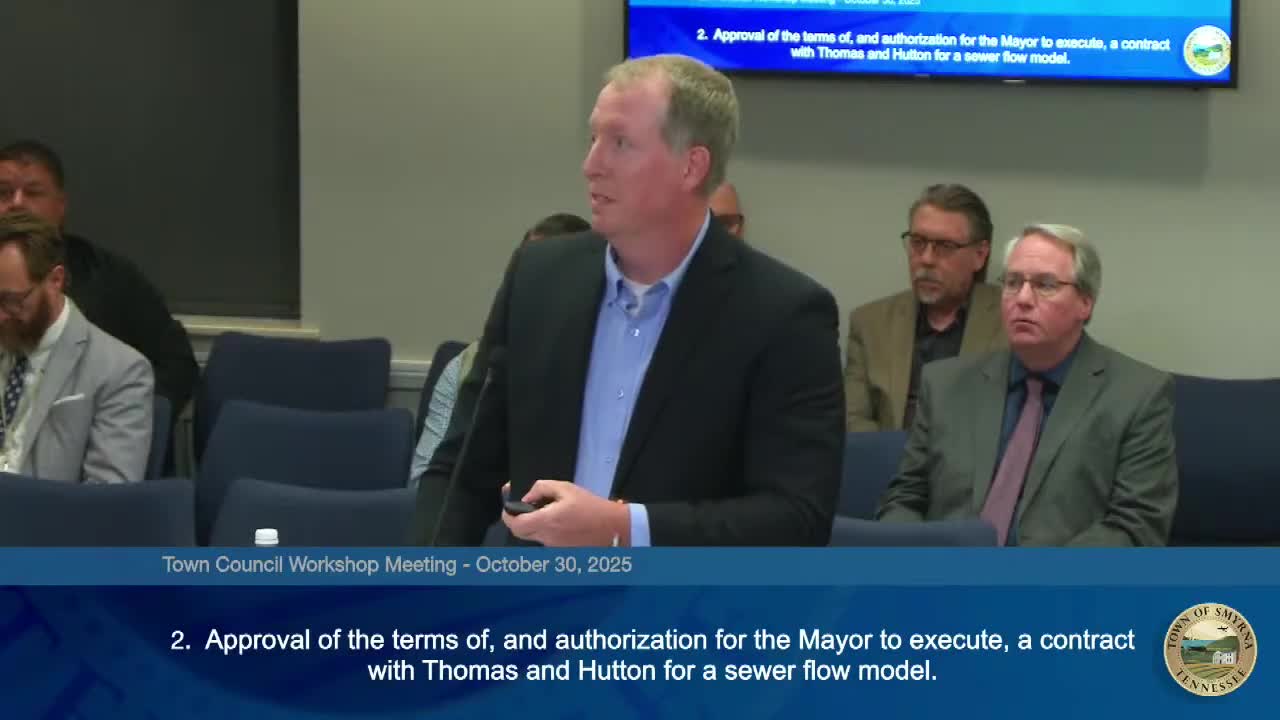Consultants tell Smyrna council leak repairs and a sewer hydraulic model can delay costly plant expansion
Get AI-powered insights, summaries, and transcripts
Subscribe
Summary
Smyrna heard detailed technical findings Wednesday on its water and sewer systems, with consultant Ryan Chamblee of Thomas & Hutton saying recent leak detection and repairs have reduced treated water and wastewater flows and that a calibrated sewer hydraulic model will help the town target repairs and time a needed wastewater plant expansion.
Smyrna heard detailed technical findings Wednesday on its water and sewer systems, with consultant Ryan Chamblee of Thomas & Hutton saying recent leak detection and repairs have reduced water loss and deferred pressure on treatment capacity.
"The current design capacity [for the water plant] is 18.3 million gallons per day," said Ryan Chamblee, environmental group leader at Thomas & Hutton. He told the council the wastewater plant operates under a discharge permit for 9 MGD and that plant infrastructure was laid out to allow expansion to roughly 12 MGD with equipment upgrades.
The presentation summarized monitoring data from January 2023 through August 2025 and two projection approaches: a straight trend-line projection and a units-built projection tied to residential development. Chamblee said repairs after a February leak-detection effort reduced water loss from as high as about 40% in 2024 to roughly 10%, a difference he estimated at about 2.5 million gallons per day and about $2.3 million in annual treatment cost savings.
"There was a reduction of about 2,500,000 gallons per day that doesn't have to be treated," Chamblee said, quantifying treatment savings and describing how that improvement pushes out the timetable for major expansions.
Chamblee and staff described ongoing inflow-and-infiltration (I&I) projects. A Phase 1 sewer rehab in an older portion of town produced post-rehab peak flows roughly half the pre-rehab measurement during comparable rain events, the presentation showed. That Phase 1 work, funded largely with ARP dollars, cost about $1.56 million; Chamblee said the ARP-funded approach yielded a two-year payback on avoided treatment costs versus a roughly 10-year payback if paid from local funds.
Council members pressed consultants about the timing for planning a plant expansion. Chamblee said Tennessee Department of Environment and Conservation (TDEC) guidance generally requires the town to begin engineering when average-day flows reach about 80% of permitted capacity. Under several scenarios presented, wastewater planning triggers could occur in the late 2020s to early 2030s depending on development pace and whether substantial new industrial users arrive.
The presentation also addressed options for reuse and advanced purification. Chamblee described a Spring Hill pilot being pursued regionally—building an advanced purification facility and reservoir to blend treated wastewater with surface water for year-round supply—and said such pilots take multiple years for design, construction and a required one-year pilot test under TDEC oversight.
Staff recommended continuing and expanding flow monitoring, CCTV and smoke testing, continuing planned rehab projects and funding the proposed sewer hydraulic model (Innovyze/Infoworks) to produce calibrated, GIS-based scenario planning that can identify where trunk lines should be upsized or where developer-built improvements would be required.
Council members and staff asked about the accounting of large industrial users (Nissan, Taylor Farms), the end date of a water-sale contract to Nolensville, and whether existing plant footprints could accommodate the next expansion. Consultants said large industrial users are included in the plant influent data but are not modeled as a baseline in residential-unit projections because such users must be handled as separate, specific scenarios.
The council did not take formal action at the workshop; staff will include the Thomas & Hutton sewer-flow monitoring and sewer-flow model contracts on the upcoming council agenda for consideration.
